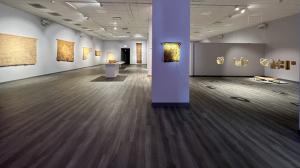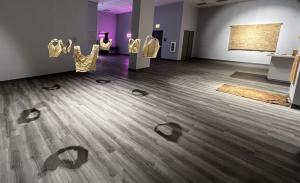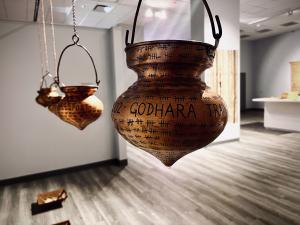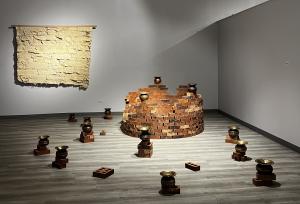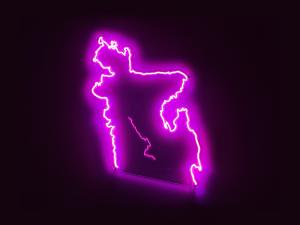The Online Partition Museum announces its first virtual art exhibition, "Unbearable Memories, Unspeakable Histories"
Pritika Chowdhry's solo retrospective, "Unbearable Memories, Unspeakable Histories," re-opens at the Online Partition Museum as a virtual art exhibition.
This exhibition was first presented at the South Asia Institute in Chicago to commemorate the 75th anniversary of the Partition of India and Pakistan. It is now being presented at the Online Partition Museum in a new online format as a 3d virtual exhibition that viewers can experience and navigate, on a computer, laptop, tablet, or smart phone.
Unconstrained by physical distances and borders, the digital exhibition uniquely manifests the vision of the Online Partition Museum as a platform to present experiential, virtual art exhibitions that thoughtfully engage with the many partitions of the Indian subcontinent.
India's independence from colonial rule in 1947 is forever linked with its ghostly twin, the Partition of India and Pakistan. Pritika Chowdhry’s exhibition investigates the Partition of India in 1947, which created Pakistan, and the Bangladesh Liberation War in 1971, which partitioned Pakistan to create Bangladesh.
The Partition is central to modern identity and geopolitics in South Asia. It triggered the largest, most rapid migration in human history and is often compared to the Holocaust, William Dalrymple notes that "Partition is central to modern identity in the Indian subcontinent, as the Holocaust is to identity among Jews, branded painfully onto the regional consciousness by memories of almost unimaginable violence." Over 20 million people were displaced in an unprecedented mass migration. Approximately 2 million people died in the communal violence across the new border, called the Radcliffe Line.
Pritika started creating sculptural art installations about the Partition of India and Pakistan in 2007. The Partition Anti-Memorial Project is her ongoing research-based project that excavates subjugated knowledge about the 1947 Partition of India and the 1971 Bangladesh Liberation War to build several experiential art installations that are temporary anti-memorials to the Partition.
The Partition has been described by acclaimed Pakistani-American historian Ayesha Jalal as “the central historical event in twentieth century South Asia.” In her words, “A defining moment that has neither beginning nor end, Partition continues to influence how the peoples and states of postcolonial South Asia envisage their past, present and future.”
Over the last fifteen years, Pritika Chowdhry has created ten bodies of work that address and examine the many facets of the Partition of India from a counter-memory perspective. Her anti-memorials create alternate ways to remember and memorialize traumatic geopolitical events, from the dual lenses of South Asian diasporic postmemory.
“Through quiet but searing installations, artist Pritika Chowdhry reckons with violence that ripples through generations: mass displacement, rape and riots tracing back to the snaking borders that split a nation.” Wrote Jacqui Palumbo of CNN in describing Chowdhry’s retrospective at the South Asia Institute. The exhibition was widely acclaimed and received international press and media coverage in America, Britain, and India.
Evoking corporeal bodies through a myriad of materials, the exhibition highlights generational resilience and resistance. To commemorate the 75th anniversary of the Partition of India and Pakistan, and the 51st anniversary of the Bangladesh Liberation War, several of the artist’s works are now featured in a 3D virtual solo exhibition at the Online Partition Museum.
About Pritika Chowdhry
Pritika Chowdhry is a feminist and postcolonial artist, curator, and writer whose work is in both public and private collections. Through large-scale sculptures and site-sensitive installations that reference the body, her work memorializes unbearable memories. Having witnessed the intergenerational effects of geopolitical trauma, Chowdhry has dedicated her artistic practice to cataloging the violence of colonialism/imperialism alongside global acts of resistance.
Through her anti-memorials, Chowdhry aims to highlight historically marginalized female voices in the representation of Partition while contextualizing the event’s global repercussions. Transnational in scope, her sculptural art installations and anti-memorials bear witness to partitions of countries, civil and military wars, riots, border violence, genocides, and terrorist attacks, holding space for mourning, remembrance, and repair.
Chowdhry has exhibited nationally and internationally in group and solo exhibitions in the Weisman Art Museum, Queens Museum, Hunterdon Museum, Islip Art Museum, Visual Arts Center of New Jersey, DoVA Temporary, Brodsky Center, and Cambridge Art Gallery.
Online Partition Museum
Counter-Memory Project
+1 312-945-8466
email us here
Visit us on social media:
Instagram
Facebook
Twitter
LinkedIn
YouTube
TikTok
Unbearable Memories, Unspeakable Histories: Anti-Memorials to the Partition of India and Pakistan
Legal Disclaimer:
EIN Presswire provides this news content "as is" without warranty of any kind. We do not accept any responsibility or liability for the accuracy, content, images, videos, licenses, completeness, legality, or reliability of the information contained in this article. If you have any complaints or copyright issues related to this article, kindly contact the author above.

